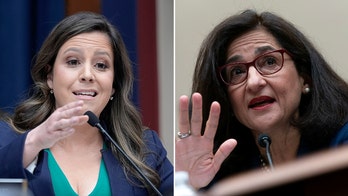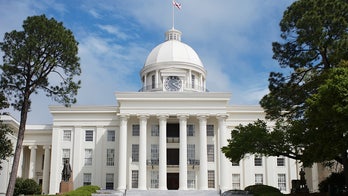The political fate of two vulnerable Senate Democrats and the race for a House seat vital to any plausible Republican plan to knock Speaker Nancy Pelosi out of power are topics that, the White House claimed Monday, are barely raising an eyebrow in the administration.
The question came up in the daily White House news briefing on the day before three key state primaries.
"How closely has the president been following the campaigns?" a reporter asked Press Secretary Robert Gibbs.
"Not that closely," Gibbs said.
Gibbs' claim of West Wing disinterest comes after Obama endorsed party-switching Democratic Sen. Arlen Specter in Pennsylvania and dispatched Vice President Biden to campaign for him. And it comes after Obama had his White House team say complimentary things about Arkansas Sen. Blanche Lincoln's bid to have big banks shed derivatives trading despite opposition from Obama's treasury secretary and his leading outside economic adviser.
What Obama hasn't done for Specter and Lincoln is campaign for them down the stretch.
Specter clearly wants an Obama visit. Pennsylvania Gov. Ed Rendell, Specter's leading get-out-the-vote voice, said Monday a last-minute Obama visit would mean at least one percentage point for Specter.
"It might jack up turnout," Rendell said, with voters heading to the polls Tuesday.
Instead Obama will fly over Pennsylvania en route to Youngstown, Ohio, where he will make remarks about the economy.
Of course, last-minute trips don't guarantee victories, as made clear when Obama campaigned for losing Virginia gubernatorial candidate Creigh Deeds, losing New Jersey Gov. Jon Corzine and losing Massachusetts Senate candidate Martha Coakley.
And Specter could very well lose the Senate primary to two-term Democratic congressman Joe Sestak on the grounds that Specter's down-the-line backing of Obama's agenda isn't good enough -- a criticism that could be vaporized by an Obama visit.
Obama hasn't been to Pennsylvania's 12th District, either, despite its evident importance to Democratic plans of minimizing GOP mid-terms gains. The sprawling western Pennsylvania district is the only one in the country that went from Democrat John Kerry in 2004 to Republican John McCain in 2008.
In this special election to fill the seat left vacant by the death of Pennsylvania political powerhouse John Murtha, Republican Tim Burns is giving Democrat Mark Critz fits, despite the a 2-1 Democratic registration edge.
Already, the Democratic Congressional Campaign Committee is pre-emptively trying to devalue a Burns victory, noting the massive GOP spending on the election and expenditures from outside pro-GOP groups.
In Arkansas, Lincoln's plans for a third term ran into a union-backed assault from the left in the form of Lt. Gov Bill Halter. The betting is Lincoln will win Tuesday, but probably not with the 50 percent she needs to avoid a June 8 runoff -- a contest that will further deplete Lincoln's campaign warchest. Meanwhile, Republican Rep. John Boozman is sure to emerge as the nominee and already leads Lincoln by double digits.
So, at a time when Democrats need to rally their base and unify against Republican, two party incumbents and a long-held House seat hang in the balance -- in part because of intra-party fissures.
"The Obama machine is just as divided as the Democrats are in Pennsylvania, or the Democrats are in Arkansas," said Democratic strategist Steve McMahon. "All those Democrats are Obama Democrats, but half of them it seems are anti-incumbent, anti-establishment, anti-Congress Democrats."
Republicans say it doesn't matter if the political seas are calm or roiling. They smell blood.
"There needs to be more than teleprompters and eloquence," said Rob Jessmer, executive director of the National Republican Senatorial Committee. "People want policy and they want the president listening to them. The bottom line is people want a check on his agenda, and that's the problem (the Democrats) have."




